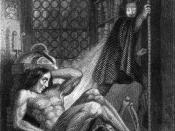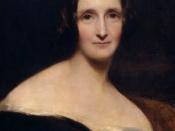Frankenstein is a novel that emphasises male tyranny and desire for power through science. The result of which leads to not only the downfall for the female characters in the text, but also for the creator of the monster and society in general. The novel also brings together the 'central dualities of a culture in which reason and science were displacing religion as centres of value' (Levine,1979:14). Therefore, in giving life to his creature, Victor may be seen as a Promethean rebel against God, an heroic quester after knowledge, refusing to accept limitations and seeking to benefit humanity: 'A new species would bless me as its creator and source: many happy and excellent natures would owe their being to me.' Yet Victor's egotism and yearning for power and glory frame him in the classic definition of the patriarch. Consequently he may be attempting to usurp the role not of God, but of woman, to sexual relations from the act of creation.
During Victor's time at university, he receives a multitude of letters from the longing, self-effacing and subserviant Elizabeth - repling to none. Elizabeth remains in Switzerland, fulfilling her domesticated womanly duties to the Frankenstein family, her only hope for the future relying on her marriage with Victor, for she, as a woman is nothing without him. This pattern of neglect that Victor demonstrates first with Elizabeth, then with the monster does not seem to phase their unconditional love for him, despite the fact that he views neither one of them as his equal. Like the monster, Victor is an isolated individual; his alienation from society however is self imposed. While the monster longs for the companionship and affection he is denied, Victor rejects the family and friends who love him; claiming it necessary in his quest for the secret...


